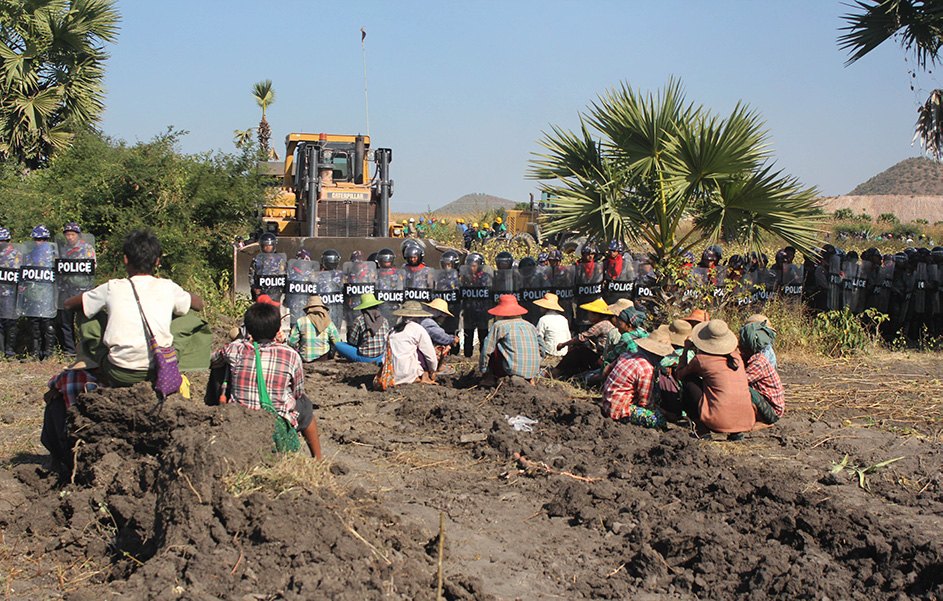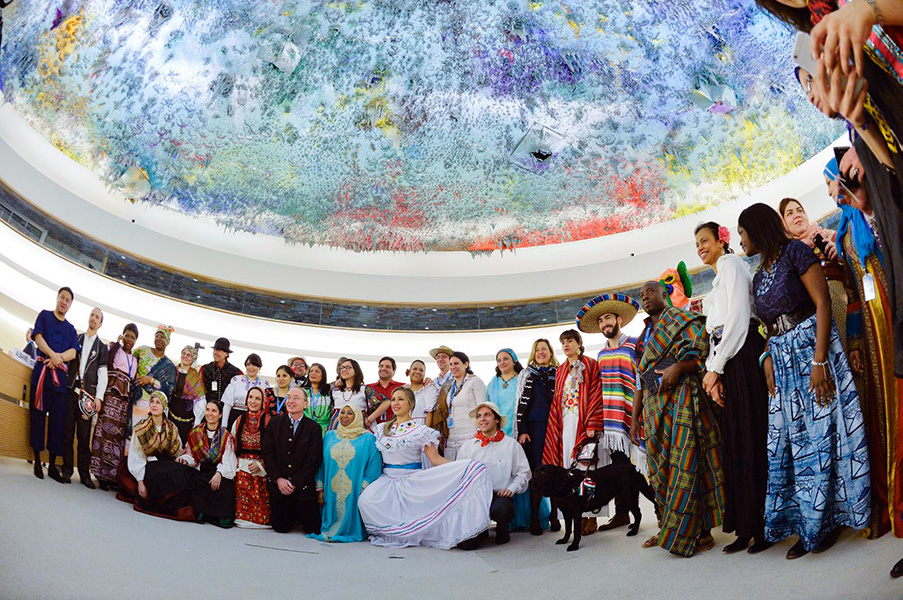UPDATE, October 22, 2021: On October 8, the UN Human Rights Council declared that a clean, healthy and sustainable environment is a human right.
As the impact of our species on the natural world intensifies, so does the knowledge of our dependency on it: from crop-pollinating critters and wild fish populations that nourish millions, to ecosystems that inhale carbon emissions and filter air and water.
These connections have bolstered a legal argument around the importance of a healthy environment — that is, intact ecosystems and animal and plant populations, as well as a stable climate. To John Knox, an expert on international environmental law and human rights law at Wake Forest University, a healthy environment is as important to human life as freedom of expression, health, work, education and other rights generally accepted under international human rights law.
Between 2012 and 2018, Knox was appointed by the United Nations to investigate the relationship between human rights and the environment as an independent expert and special rapporteur. As he concluded his term, Knox urged the UN General Assembly to formally recognize the right to a healthy environment through a treaty or resolution. Yet the right to a healthy environment still remains a “missing human right” at the UN level, Knox writes in the 2020 Annual Review of Law and Social Science.
Over 150 of the 193 UN member nations already recognize the right to a healthy environment, either through constitutions, general legislation or regional human rights treaties — albeit with varying degrees of enforcement and impact. Recognizing the right at the UN level, Knox argues in an interview with Knowable Magazine, could help communities around the world make more powerful legal arguments to preserve nature. This conversation has been edited for length and clarity.
This idea that we all have a fundamental right to a healthy environment — where does that come from?
The idea has really been around since the dawn of the modern environmental movement in the late 1960s and early 1970s. Since then, many countries have adopted the right in their constitutions. And in the last 25 years, you have thousands of decisions from courts around the world interpreting the constitutional right to a healthy environment.
How do we decide what counts as a human right? And why should nature — or a healthy environment — be included?
Every single human right you might want to exercise depends on having some place where you can live. You can’t really have a life of dignity, freedom and equality without having some minimum environmental standard.
How far has this right spread around the world?
The human right to a healthy environment has been recognized in a number of regional human rights treaties, including in Africa and Latin America. And in fact, the majority of the world’s countries have recognized in their national constitutions a right to a healthy environment.
In the United States and some other influential countries, this right has never been included in the national constitution. And the United Nations has never recognized it.
In the countries that already recognize this right, what impact is that having?
David Boyd, who later became my successor at the UN, wrote a book, The Environmental Rights Revolution, in which he looked at the worldwide spread of the right to a healthy environment. He found that countries that had adopted the right tended to perform better across a whole host of different environmental indicators.
For example, in Costa Rica, the constitutional right to a healthy environment is cited by legal experts I’ve spoken with as being one of the main reasons why the country’s environmental policies are as strong as they are. Of course, there’s always a question about causality — maybe countries already more interested in protecting the environment are more likely to adopt that right.
The constitutions of many nations recognize a human right to a healthy environment, either explicitly or because their courts have ruled that such a right is implied by other constitutional rights (light blue). Other nations have enshrined the right in legislation or as part of international treaties (dark blue). A few countries — notably major industrial nations such as the US, UK, China, Japan, Canada and Australia — have not recognized this human right (grey).
A human rights perspective also gives you a way of applying an already developed area of law without having to create everything from scratch, and a path into forums that might not otherwise be open to discussing environmental issues. Courts will listen to human rights arguments.
In a remarkable decision in December 2019, for instance, the Dutch Supreme Court held that the government had failed to comply with its climate change obligations under human rights law and ordered it to reduce its greenhouse gas emissions more quickly. I doubt that would have been possible without casting climate change as a human rights issue.
What difference would it make to acknowledge this right at the UN level?
For one, things would be much simpler if I could just say, “There is a human right to a healthy environment,” rather than having to argue how other human rights depend on environmental health. I think that’s actually quite important.
It would also clarify the basis for United Nations institutions to examine this right. The United Nations Human Rights Council has something called the Universal Periodic Review, through which it reviews the human rights record of every country. Environmental issues do come up because they’re related to other rights. But if you had a human right to a healthy environment, it would be a much more logical review process.
Finally, it would push countries that have not adopted it yet to accept and implement it domestically. And it would put more pressure on countries that have adopted it but haven’t done anything to implement it.
Practically speaking, what would this mean for communities on the ground who are suffering from environmental injustice?
Of course, recognizing something as a right, even if it’s recognized in a formal way in the law, doesn’t necessarily mean that it’ll be implemented — many countries’ constitutional right to a healthy environment is aspirational. There are really powerful interests in our societies operating against it. There’s a desire around the world for greater economic growth, which is driven by extraction and exploitation of natural resources. Many of the people who are most dependent on natural resources such as forests, rivers or coastlines are often marginalized already. The forces trying to exploit these resources often roll over the rights of these already marginalized groups.
But say you’re a community that’s being adversely affected by a mining operation. It’s much easier to make your case in court if you can say your rights are being violated because someone’s destroying the environment on which your community depends, than if you have to indirectly argue that your right to health, for instance, is affected by environmental destruction.

Farmers in Myanmar protesting eviction from their land for a copper mine in 2014. Recognizing a human right to a healthy environment could give local people a better chance of opposing development that threatens the nature around them.
CREDIT: AP PHOTO
It also provides a clearer legal framework for local, national or regional human rights bodies that review these kinds of claims. If the courts haven’t been particularly friendly to your claim, maybe you’d like to raise it with your own country’s national human rights institution, or with a regional human rights tribunal or global human rights body. The clearer the recognition at the international level, the stronger a basis you’ll have at that review level.
I want to emphasize, though, that many local communities can make human rights arguments already in relation to environmental protection. For example, there’s no doubt that it violates human rights if a member of a local community is receiving death threats or is even killed because of the work they’re doing on behalf of their community to protect the environment.
Is there any reason not to acknowledge the right to a healthy environment as a human right?
For a long time, environmentalists have been concerned that we spend too much time thinking about the environment in terms of its benefits to human beings, and that the environment has intrinsic benefits we shouldn’t subordinate to human interests. But the more we understand the ways in which we humans are dependent on a healthy environment, the less gap there is between a human-centered and an ecocentric approach to environmental protection. We can’t really have a healthy environment unless the environment is healthy for everything else that lives here as well.
A second way you could respond to this concern is to say, well, why don’t we just give nature its own rights? Some states have started to do that, such as New Zealand, which granted the Whanganui River legal personhood a few years ago. That approach hasn’t been incorporated into international law or adopted at the UN level yet.

Delegates to the United Nations Human Rights Council wearing their countries’ traditional dress, shown here meeting in 2015. The council periodically reviews the human rights record of each UN member country. UN recognition of a healthy environment as a basic human right would give the council more direct authority to review countries’ environmental policies from this perspective.
CREDIT: UN PHOTO / JEAN-MARC FERRÉ
What about those countries that are opposed to recognizing a clean environment as a human right?
Governments like the United States and the United Kingdom have never been particularly happy about adopting economic, social and cultural rights. For instance, the United States is not a party to the International Covenant on Economic, Social and Cultural Rights, and such rights aren’t reflected in the US Bill of Rights. The United States has been, let’s say, cool to the idea that you could have rights to things like health, water or food.
Other countries that have not accepted the right to a healthy environment at the national level include China and Japan. While it’s only a minority of countries that haven’t accepted this right in any form, some of those countries are quite powerful. So it’s understandable that this hasn’t happened yet at the United Nations.
Do you see any signs that the UN is moving closer to formally recognizing the right?
There is a great deal of support for it at the UN Human Rights Council. Many states have taken positions in favor of a resolution supporting the right to a healthy environment. Another sign of growing support is that several heads of major UN agencies have recently come out in favor of UN recognition; an example is Inger Andersen, the head of the UN Environment Programme. She recently issued a statement to the Human Rights Council on behalf of 15 agencies, expressing support for the right to a healthy environment to be adopted at the UN level.
This is unprecedented. The Human Rights Council’s resolution this year did not refer to the right to a healthy environment, but the Council is coming closer to doing so. If and when the Human Rights Council does adopt a resolution, then the next step would be for the General Assembly to do so in the fall.
All that’s required for the United Nations to formally recognize the right is a majority vote. I could imagine it being adopted maybe as soon as this year, or in 2022, which will be the 50th anniversary of the 1972 Stockholm Declaration, the first major international instrument that links human rights and environmental protection.




